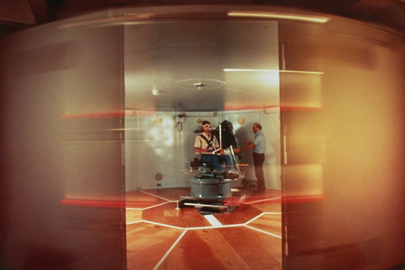Graybiel Lab poised for next round of space exploration
Privatization of the industry will require training the lab can provide
A 30-year chapter in the history of space travel has ended with the landing of the space shuttle Atlantis, and what comes next is still unknown. But whatever direction the story takes, researchers of the Ashton Graybiel Spatial Orientation Laboratory are ready to assist.
For the moment, American travelers to the International Space Station will get there on Russian rockets, new U.S. missions are still in the proposal stage, and the emphasis of the government is on privatization. NASA's Commercial Crew and Cargo Program is spending hundreds of millions of dollars in Recovery Act Funds to encourage private development of human spaceflight.
In April, NASA awarded $269.3 million to six companies to accelerate opportunities both for payloads such as satellites and for individuals to go into space on craft operated by the private sector. While this new opportunity may conjure images of vacationers who want to catch a close-up glimpse of the moon, experts in the field of space travel say this is not so far off.
Companies are currently taking reservations for suborbital flights on their spaceships. And payload specialists - astronauts who are taken on space flights to perform a specific task - will be needed to carry out research and commercial work. But these new astronaut passengers must be trained to withstand effects of space travel such as motion sickness and disorientation.
The Graybiel Lab is one of a handful of facilities in the country where that training can be done, and its personnel already are in advanced talks with a potential first customer.
It all started when executives of Astronauts4Hire, a non-profit matchmaker among the suborbital research community that trains payload specialists and tourists for private space flight, saw a Jan. 19 NOVA ScienceNow episode that addressed the challenges of getting a manned mission to Mars. The show included footage of the Graybiel Lab's Rotating Room, an artificial gravity research laboratory that can spin to 35 revolutions per minutes. They contacted Janna Kaplan, a senior research associate and lecturer in psychology at the lab to discuss a partnership.
A memorandum of understanding between the Graybiel Lab and Astronauts4Hire was signed in early July outlining areas of development, rights of confidentiality and propriety information for training astronauts to be payload specialists.
"Our unique ability to contribute is our expertise in studying human motion sickness," says Kaplan, who researches human adaptation to various conditions of space flight such as weightlessness, macro-gravity, artificial gravity, and virtual environments. The lab is equipped to train for motion sickness symptoms and adaptation as well as disorientation and recovery and adaptation, where multiple exposures can decrease the discomfort and improve human productivity in moving environments, including space flight.
Is addition to developing training paradigms for their required components, such as motion sickness assessment and training, artificial gravity exposure and training and general spatial orientation - how do you position your body and see where you are in your environment when forces around you change - Kaplan says there is also general endurance and training that involves linear motion, oscillations, vibrations, and rotations as well as virtual environments.
"The idea is that with some regularity, especially before a space flight, our people would go to the Ashton Graybiel Laboratory for training," says Brian Shiro, chief executive officer of Astronauts4Hire. "If we're [in space] performing a research job or experiment for a client, we can't afford to be sick or disoriented or distracted. You only have four to five minutes on a sub-orbital flight to get a job done."
James R. Lackner, Riklis professor of physiology and co-director of the Graybiel Lab, says the facility is well-positioned for this type of work.
"We probably have more experience in parabolic flight than any research group in the world, in terms of human factors," Lackner says. "And we have the only functioning full-scale artificial gravity environment operational in the world in the present time."
The rotating room was built on campus and many of the parts were manufactured at the Brandeis machine shop. The lab has been running since 1982 and computer systems were recently updated.
Kaplan says that regardless of how the leadership in space travel evolves the lab will maintain its research focus on basic science issues such as how humans adapt to different force environments. This research, she said, is relevant to space flight, but covers a lot more.
"The processes that take place in our body when we orient ourselves in space are very similar and very relevant to rehabilitation and recovery in many types of medical problems," Kaplan says.
The lab recently completed a study for the U.S. Navy of how sleep deprivation, fatigue and being in a moving environment effects human performance in cognitive perceptual and motor tasks as well as balance control.
"We're happy to interact with various groups who are trying to pursue space flight and exploration outside of the government sector," says Lackner. "Right now everything in the government is either on hold or not backed up with financial support. I really see the future with the private folks."
Among the many companies vying for their market in space travel include-
• Alabama based Rocket City Space Pioneers
• Richard Branson’s Virgin Galactic
• The Boeing Company
• Sierra Nevada Corporation
• California based companies SpaceX and Moon Express
Categories: Research, Science and Technology







